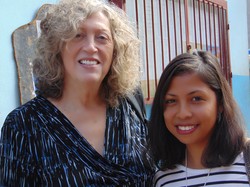Presbyterian mission co-worker Jan Heckler approaches education in Madagascar with a deep passion in her heart and a learned wisdom.
“I was called by the Lord in 1999 to go to Africa,” Heckler says. She followed that call to a country where 92 percent of the people live on less than $2 per day. While change won’t come quickly, Heckler and the Presbyterian Church (U.S.A.) Malagasy partners believe expanding and improving education will result in higher incomes and a better quality of life.
“The stranglehold this level of poverty has on Madagascar will not be changed overnight by simply better educating its populace,” Heckler acknowledges. “But the World Bank, the IMF (International Monetary Fund), UNESCO (United Nations Education Scientific and Cultural Organization) and nearly all others who address the question agree that it is the number one thing to do to help a nation develop and to develop more quickly.”
Heckler’s spirit-shaped commitment joins hands with her hard-earned expertise acquired through four decades of experience as a researcher, consultant and teacher. Heckler works with schools affiliated with the Church of Jesus Christ in Madagascar, better known by the Malagasy acronym, FJKM. The initial results of the instructional methods she is introducing alongside her Malagasy colleagues are remarkable.
In a pilot project, scores on cumulative final exams improved from the term-ending average of 60 percent to 90 percent correct. This substantial improvement occurred after only one term of teaching with the new methods. The methods are part of the “Evidence-Based Methods of Instruction” (EBMI) that the FJKM wants to introduce in all its 723 primary and secondary schools. Heckler says EBMI has an excellent record of success in a wide variety of classroom settings.
Heckler wrote a teacher training text on EBMI, titled “Teaching Methods that Really Work! Evidence Based Methods of Instruction”thatwas published in 2010. It includes many practices she field-tested in Malawi and Namibia over a four-year period. The results convinced her EBMI makes a lasting impact on learners.
In 2007 Heckler visited Malawi, where she had helped implement EBMI three years earlier. “The EBMI learners who had gone on to secondary school by then had, as a group, come to everyone’s attention for being at the top of their classes—even though EBMI was not being used in their secondary schools,” she says. She attributes the success in large part to students “learning to learn” and by their increased self-confidence and better attitudes toward learning.
In Madagascar, the struggle is not only to improve classroom instruction, but also to encourage children to stay in school. Madagascar’s educational level is just 5.2 years, and the primary school dropout rate is 65 percent.
It’s a challenging situation, but Heckler’s strong sense of a call helps her persist in her work. She was helping teach adult Sunday school at North Decatur Presbyterian Church in metro Atlanta when she first felt God nudging her toward international service. “It became clear to me that God’s expectation of loving our neighbors is not limited by proximity,” she says.
As the 1990s drew to a close, a compassion for Africa’s children pulled heavily on her heart. Heckler expressed her interest in Africa to Presbyterian World Mission, and while the staff was impressed with her commitment and qualifications, the door to mission service didn’t open at the time. So Heckler sought other ways to be faithful to her call.
That search led Heckler to help found a non-profit organization, the World Literacy Initiative. She volunteered as its executive director, trained African teachers and consulted with ministries of education on the continent. In addition to Malawi and Namibia, she also worked in Ethiopia and Zimbabwe. Before going to Madagascar, the time she spent physically in Africa over a seven-and-a-half year period totaled six years.
When Heckler learned about the position in Madagascar, she was moved to apply for it. As a committed Presbyterian, Heckler says continues to be “thrilled” to receive a mission appointment from her church. She arrived in the island nation 260 miles off Africa’s southeast coast in April 2012.
Implementing EBMI in all FJKM schools requires a massive, multi-year effort, but she says FJKM leaders are committed to it. Implementation will require training current teachers as well as those preparing for careers in teaching at the FJKM’s teacher-training college, which is part of the Reformed University of Madagascar.
Heckler says, just as it is back home, success in school in the developing world is critical, but a major difference is the lack of learning opportunities outside the classroom in developing countries. Summer camps, afterschool programs, public libraries, and other enrichment opportunities are nearly absent in Madagascar. Most students come from homes where there are no books, magazines, TVs, or computers, and their parents usually have little or no formal schooling.
“So, if the school doesn’t work, there are practically no safety-nets and the child will likely suffer as a result his or her entire life,” Heckler says. “If you do learn in school, you reap benefits your entire life.”
The advantages of basic education skills, she says, can be seen in rural areas when subsistence farmers seek to move beyond subsistence and learn new agricultural techniques, and in cities when workers want to acquire new job skills. Churches and communities, she notes, also profit from a better-educated populace.
“In the United States you hear a lot about education reform, but our partners and I agree that what’s needed in Madagascar—and what we are being most intentional about—is to exact an education revolution rather than just reform,” Heckler says.
For Heckler and her partners, it’s a revolution centered in the “life-transforming power of the Lord’s Spirit working through each one of us.” Her work, she says, is sustained by her conviction that God wants a better life for the people of Madagascar.

